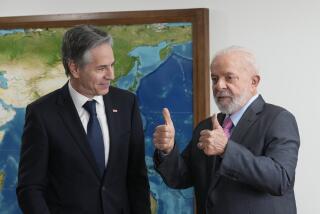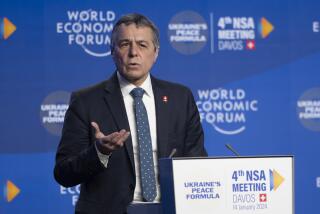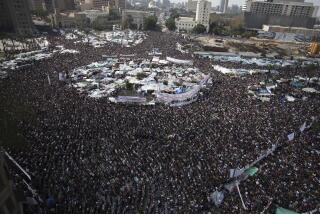Fiery Leftists Hold Their Own Forum
PORTO ALEGRE, Brazil — About 40,000 social activists with widely varying causes and temperaments descended on this South American city Thursday for the opening of the World Social Forum, a five-day gathering that is part radical teach-in, part angry political rally.
Intended as a dramatic counterpoint to the meetings of the World Economic Forum in New York, the event unfolded mostly peacefully, despite fears of violence that brought a strong police presence to the city’s downtown.
“I’m hoping to get a lot of energy here, to feel that we’re not fighting all by ourselves,” said Liesbet Vanmechelen, 31, who helps run an anti-poverty group in Belgium. She joined a group of colleagues in unfurling a banner in downtown Porto Alegre that read, in Flemish: “Struggle Against Injustice.”
The activists here see their meeting as the democratic shadow to the gathering in New York. About 150 countries are represented, and members of several grass-roots groups trekked across South America by land to get here.
More than 600 workshops are scheduled, covering topics such as genetically engineered crops, the rights of indigenous people, reparations for the descendants of slaves and affordable housing for the poor.
In an attempt to embrace so many causes, the official theme of the event was predictably vague and inoffensive: “Another World Is Possible.”
With all hotels here fully booked, organizers housed many delegates in motels and in a tent city built on the edge of town.
The delegates include environmentalists, trade unionists, peasant organizers and leftist intellectuals such as Noam Chomsky, whose news conference Thursday served as an unofficial opening to the event attended by about 300 journalists.
The Massachusetts Institute of Technology linguistics professor and peace activist spoke of “class warfare” waged by “illegitimate power concentrations,” an oblique reference to the corporate and political leaders meeting in New York. The scholar was treated like a Hollywood celebrity by the mostly European and Brazilian press corps here, his entry greeted with a fusillade of camera flashes.
Chomsky was only one of a parade of radical luminaries due in for the conference. Nobel peace laureate Rigoberta Menchu of Guatemala will chair a panel Monday.
Luis Inacio da Silva, a leader of Brazil’s Workers’ Party and the favorite in this year’s race for the country’s presidency, held a news conference Thursday morning. He denounced free trade and hinted that, if elected in October, he would seek to renegotiate Brazil’s foreign debt.
“I think the world would be sensitive so that not one government in the world allows a child to die from hunger in order to pay debt that could be negotiated,” he said.
Like Chomsky, he was also sharply critical of the proposed Free Trade Area of the Americas, or FTAA, that President Bush wants in place by 2005, saying it would amount to “annexation of Latin America by the United States.”
Later, about 20,000 activists, more than a few carrying red banners calling for socialist revolution, marched through the city center under the watchful eye of hundreds of police. Fearing violence, McDonald’s restaurants posted armed guards.
Organizers denied entry to the forum to a group of activists linked to Basque separatists and also excluded a representative of the World Bank, fearing that his presence might stoke the passions of activists and lead to violence.
But the mood here was mostly festive. As the march wound through downtown streets, a group of Argentine activists beat pots and pans, a form of protest that has become emblematic of the anger of their country’s middle class. Argentina has been suffering through recession and a currency devaluation.
Verediano Pineido, a schoolteacher, came to Porto Alegre from a small village hundreds of miles away in Brazil’s Amazon region, a three-day journey that included 12 hours on a riverboat. Pineido is a union organizer in a region known for political assassinations.
“I’m hoping to tell people about where I’m from,” said Pineido, a man with sharp, indigenous features. “And I came to see what I could learn from people in other places.”
Jose Acuna rode in a van all night from Buenos Aires, along with other members of his Argentine group of inner-city squatters.
The squatters’ neighborhood was demolished decades ago so that a highway could be built, Acuna explained. Since then they have taken over abandoned houses in Buenos Aires.
Acuna had come hoping to find allies for his neighborhood’s struggle. But on the conference’s first day, he turned away a bit disappointed. “There’s too many college professors here,” he said. “Maybe tomorrow we will find some people who can help us.”
More to Read
Sign up for Essential California
The most important California stories and recommendations in your inbox every morning.
You may occasionally receive promotional content from the Los Angeles Times.











